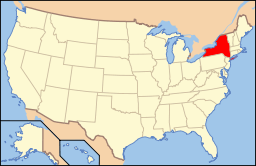Roberts Hall (Ithaca, New York)
|
Roberts Hall | |
 Stone Hall, Roberts Hall and East Roberts were demolished in the 1980s. | |
  | |
| Location | Cornell University campus, Ithaca, New York |
|---|---|
| Coordinates | 42°26′55″N 76°28′44″W / 42.44861°N 76.47889°WCoordinates: 42°26′55″N 76°28′44″W / 42.44861°N 76.47889°W |
| Built | 1906 |
| Architect | George L. Heins, Morris Kantrowitz, |
| Architectural style | Beaux Arts, Renaissance |
| MPS | New York State College of Agriculture TR |
| NRHP Reference # | 84003191 |
| Added to NRHP | September 24, 1984[1] |
Roberts Hall was a building on the Ag Quad of Cornell University, and is the second building of that name. The original Roberts Hall was built in 1906, and was listed on the U.S. National Register of Historic Places in 1984.[1][2] The 1906-built Roberts Hall was demolished before the construction of the new building and Kennedy Hall.[3] The current building holds many of the administrative offices of the College of Agriculture and Life Sciences[4] and Cornell's landscape architecture program. Both buildings were named for Isaac Phillip Roberts, director of the College of Agriculture from 1874-1903.
The 1906 building is still listed on the National Register, apparently erroneously as the building is no longer there. East Roberts Hall and Stone Hall are two other former Cornell University buildings that were and are similarly listed.
In 1973, Franzen and Associates, the architectural firm that was designing Cornell's statutory college buildings at that time, conducted a study indicating that Roberts, East Roberts, Stone, Caldwell and Comstock Halls were unsafe and should be condemned. Franzen concluded that it would cost $14 million to renovate the five buildings and that it would be cheaper to tear them down and replace them with new buildings, presumably designed by Franzen. (Ironically, as of 2010, Caldwell and Comstock Halls are still in use, but another Franzen-designed building, the north wing of Martha Van Rensselaer Hall, had to be demolished as structurally unsound.) By 1978, the cost of demolishing the five buildings and building two replacements had escalated to $18 million. In response, two groups, Historic Ithaca and a student-group called the "Ag Quad Preservation Society" applied to list the five buildings on the National Register and sought to protect them under a newly enacted Ithaca historic preservation ordinance. Just before Historic Ithaca could gain a court injunction to stop the demolition of Roberts, East Roberts and Stone Halls, Cornell began the demolition.[5] The State of New York renovated Caldwell and sold Comstock back to Cornell for use as a computer center.
Kennedy-Roberts Complex

Kennedy Hall and the ″new″ Roberts Hall are one large complex, joined together with access between each through the ground floor and the fourth floor. On the first floor of Kennedy Hall is the David L. Call Alumni Auditorium, also known as 116 Kennedy Hall. The Call Auditorium jets out from Kennedy Hall to the east. Outside, to the north of the auditorium, is a small plaza, complete with seating and an area of shrubs and trees in a large planting bed directly abutting the building. The planting was designed and executed in the spring of 2011 by students in a cross-listed landscape architecture (LA) and horticulture (HORT) class as part of their curriculum. The class, LA/HORT 4910/20 — Creating the Urban Eden: Woody Plant Selection, Design, and Landscape Establishment, was co-taught by Peter J. Trowbridge and Nina Bassuk.[6]
References
- 1 2 National Park Service (2008-04-15). "National Register Information System". National Register of Historic Places. National Park Service.
- ↑ http://www.cornell.edu/tours/tidbit_templateddca.html
- ↑ http://www.cornell.edu/search/index.cfm?tab=facts&q=&id=3
- ↑ http://www.cornell.edu/search/index.cfm?tab=units&id=495
- ↑ Landsman, Jon (January 22, 1979). "Ag, Local Groups Working to Save 5 C. U. Buildings". Cornell Daily Sun. 95 (73). p. 1. Retrieved 2010-09-23.
- ↑ Cramer, Craig Douglas (15 April 2011). "Sod sofa ‘recycled’" (Blog). Cornell Horticulture. Dept. of Horticulture. Retrieved 9 June 2015.

